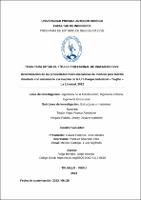Determinación de las propiedades físico-mecánicas de mortero para ladrillo diseñado con material de excavación de la Urb Parque Industrial – Trujillo – La Libertad, 2022

Date
2023Author(s)
Tirado Vega, Franco Alexander
Vergara Robles, Jhoisy Dayane Kathleen
Metadata
Show full item recordAbstract
En la presente tesis investigamos sobre la determinación de las propiedades físicas y mecánicas (análisis granulométrico, peso unitario suelto y compactado, contenido de humedad, ensayos de resistencia la compresión con cubos de mortero, prismas de albañilería y muretes de albañilería) para un mortero F’c= 175 kg/cm2, utilizando cemento y sustituyendo agregado fino con material de excavación de la Urb. parque Industrial, Trujillo, La Libertad en distintas dosificaciones (25%, 50% y 75 %) para reforzar el mortero. El enfoque que utilizaremos en este estudio es de naturaleza cuantitativa e involucra tanto la metodología de investigación básica como la aplicada.
Para ello, en primer lugar, profundizamos en las características del agregado fino durante el procedimiento, basándonos en la Normatividad Peruana NTP 400.012. Una vez obtenidos los datos, procedemos a construir el diseño de la mezcla de concreto de acuerdo con los principios establecidos por el American Concrete Institute (ACI 211.4). Es de vital realizar un óptimo diseño, ya que esta nos permite calcular las cantidades que usaremos en la dosificación de la mezcla. En este caso utilizaremos cemento y, en sustitución del árido fino con dosis variables (25%, 50% y 75%). Tener en cuenta la dosificación permite que nuestra mezcla sea trabajable y que su resistencia de diseño no sea deficiente.
Con las muestras obtenidas (patrón, 25%, 50% y 75% de material de excavación) se procedió a determinar su resistencia a la compresión tanto axial, como diagonal; para lo cual realizamos los siguientes ensayos: prismas de albañilería según la Norma NTP 399.605, por especímenes cúbicos de 5 cm por lado, según la Norma NTP 334.051 y el ensayo de muretes de albañilería según la Norma NTP 399.621.
Finalmente, se realizó la evaluación de todos los ensayos mediante el uso de tablas y gráficos comparativos los valores obtenidos en los ensayos realizados según las distintas dosificaciones empleadas (25%, 50% y 75 %) ensayados a los 7, 14 y 28 días. In this thesis we investigate the determination of the physical and mechanical properties (granulometric analysis, loose and compacted unit weight, moisture content, compressive strength tests with mortar cubes, masonry prisms and masonry walls) for a mortar F'c= 175 kg/cm2, using cement and substituting fine aggregate with excavated material from the Industrial Park, Trujillo, La Libertad in different dosages (25%, 50% and 75%) to reinforce the mortar. The approach we will use in this study is quantitative in nature and involves both basic and applied research methodology.
To this end, we first delve into the characteristics of the fine aggregate during the procedure, based on the Peruvian Standard NTP 400.012. Once the data were obtained, we proceeded to construct the design of the concrete mix according to the principles established by the American Concrete Institute (ACI 211.4). It is vital to perform an optimal design, since it allows us to calculate the quantities that we will use in the dosage of the mixture. In this case we will use cement and, in substitution of the fine aggregate with variable doses (25%, 50% and 75%). Taking into account the dosage allows our mix to be workable and that its design strength is not deficient.
With the samples obtained (standard, 25%, 50% and 75% of excavation material), we proceeded to determine their axial and diagonal compressive strength, for which we performed the following tests: masonry prisms according to Standard NTP 399.605, by cubic specimens of 5 cm per side, according to Standard NTP 334.051 and the masonry wall test according to Standard NTP 399.621.
Finally, the evaluation of all the tests was carried out using comparative tables and graphs with the values obtained in the tests carried out according to the different dosages used (25%, 50% and 75%) tested at 7, 14 and 28 days.
Subject
Collections
- Ingeniería Civil [1260]

